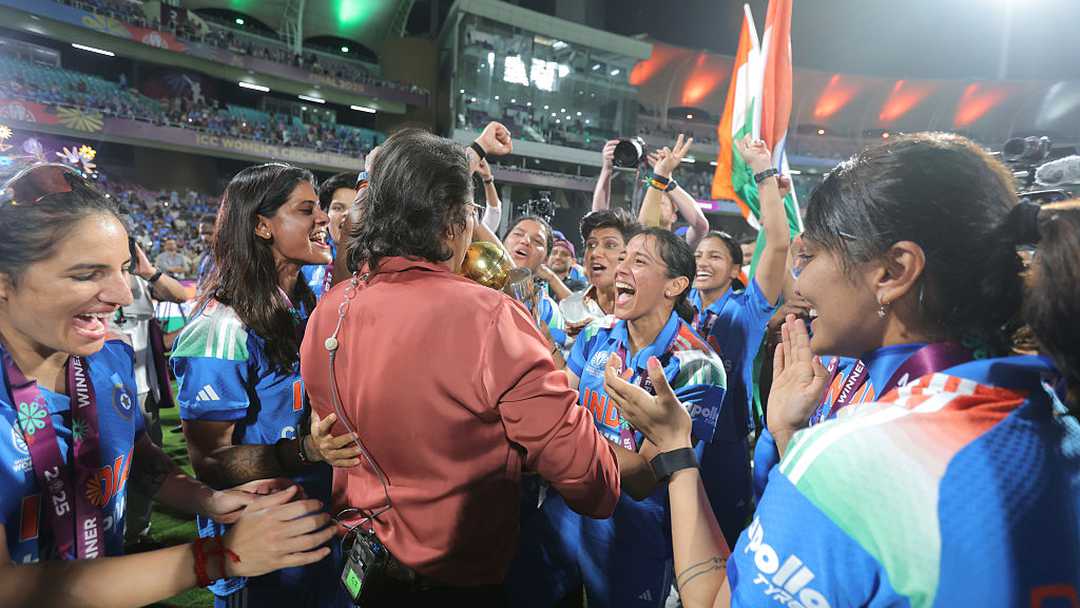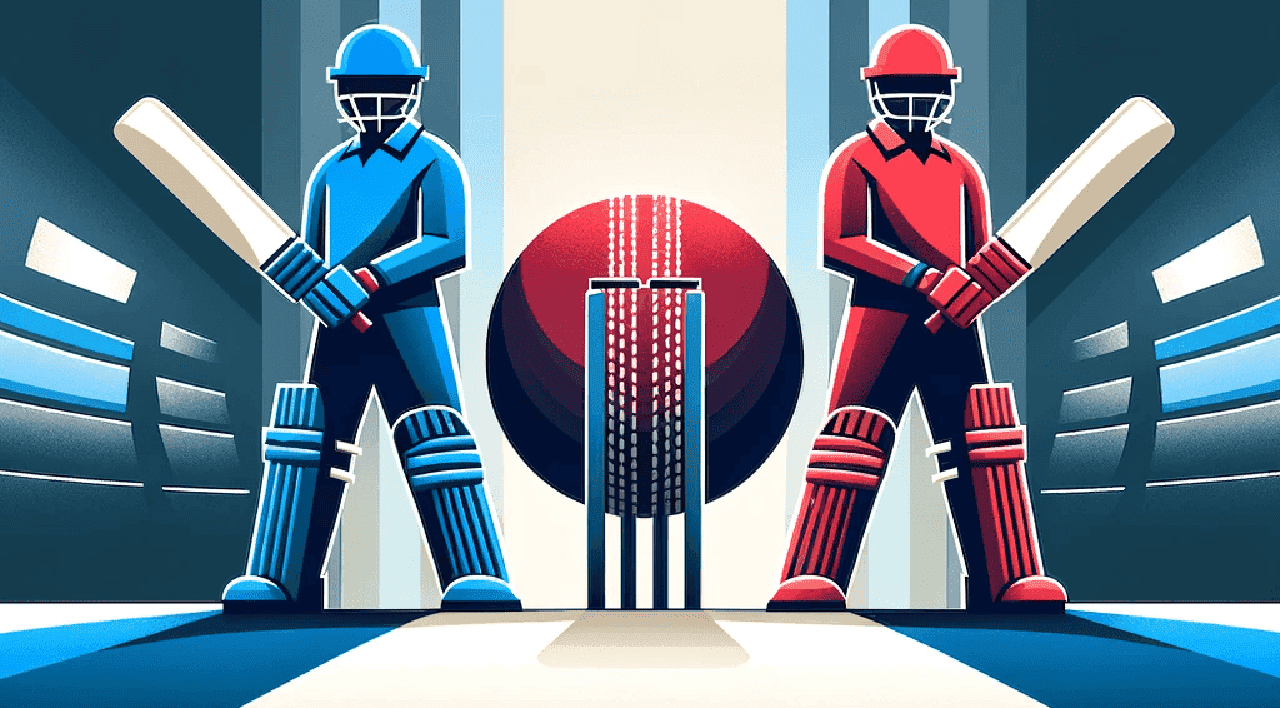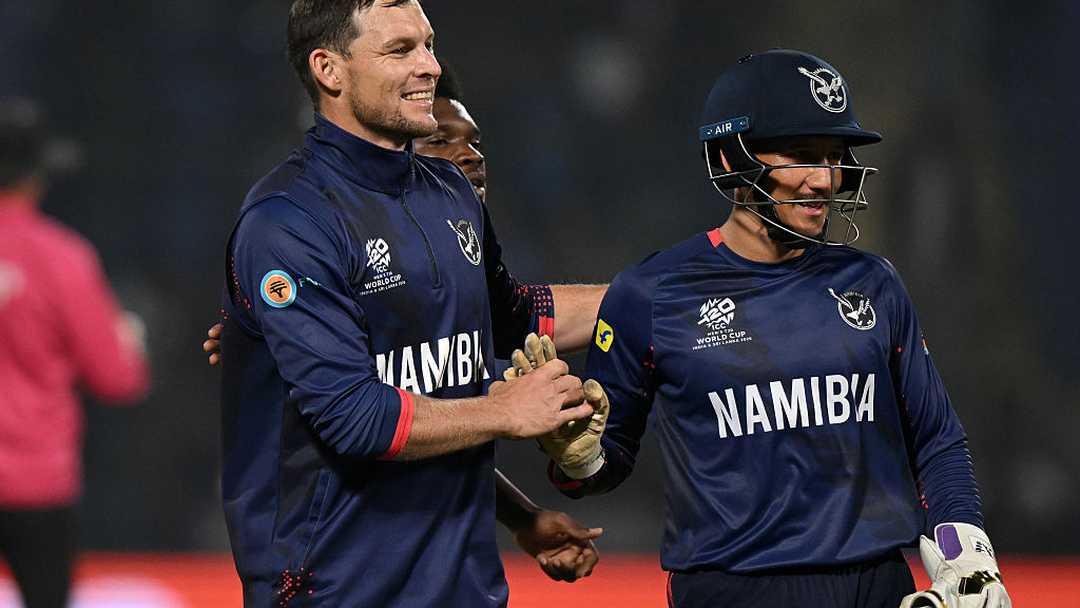
Two-way promises and a sing-along: India's full circle at the World Cup
A day after India's stunning victory over Australia in the semifinals of World Cup 2025, Harmanpreet Kaur sent a decade-old video to former India cricketer Reema Malhotra as a promise.
The clip, from the 2011-12 season, showed the duo's jubilant on-field celebrations after North Zone beat five-time defending champions Central Zone in the Inter Zonal Women's One-Day final. For Harmanpreet, every run in Jemimah Rodrigues' epochal 127* that took India closer to victory over the defending champions was a reminder of that underdog victory years ago.
When India finally ended their World Cup trophy drought on Sunday, Harmanpreet's zealous sing-along with Malhotra to 'Sadda Haq' wasn't just celebration—it was the realization of a long-cherished and shared dream.
Former captains Jhulan Goswami, Anjum Chopra, and Mithali Raj were also part of the broadcast that switched from analysis to celebrations as the team enveloped the quartet in their victory lap. Former legends Diana Edulji, Shubhangi Kulkarni, and Sudha Shah, as well as former long-time team manager Trupti Bhattacharya, were also handed the long-awaited trophy.
For a teary Goswami, it was the fulfillment of a two-way promise.
Back in the 2022 edition, when India were knocked out by South Africa, Goswami's dream slipped away as she sat helplessly in the dugout, sidelined by injury. That night, Harmanpreet and Smriti Mandhana vowed: "We'll lift the next World Cup for you." The veteran pacer, a mentor to both, replied, "Then, no matter what, I'll be there to see it happen."
She kept her word when India knocked out the defending champions. Taking a break from her duties at the CAB, Goswami flew to Navi Mumbai for the title clash, where Mandhana and Harmanpreet fulfilled theirs. In front of 40,000 roaring spectators and millions watching from home, the promise found its perfect ending.
"I did not expect that they'll stop the broadcast for 10 minutes only to let us enjoy the moment and be part of those celebrations," Goswami recalls. "We saw the victory lap coming towards us and we were hoping we could catch a couple of players for a quick interview. But the way we became part of that victory lap is something that will always remain very special."
To the leading wicket-taker in WODIs, this ranks above all her personal achievements despite not being part of the winning XI. "Harman and Smriti may be big names, but they have even bigger hearts. They are different," the veteran pacer beams.
"Making us part of their celebrations was a huge tribute this team paid to us even in what was their moment of glory. It shows that they didn't forget their history, that they didn't ignore their roots. I don't think anyone has given ex-cricketers a tribute as special as this on the ground."
Malhotra concurs. "Harman and Smriti are the pillars of this team. They didn't keep the win to themselves. The team didn't celebrate their win—they shared it with the whole country."
Malhotra compares this batch to previous ones that made the World Cup final but faltered. "I can only talk about the 2005 side that made the final for the first time. In the dressing room, we only repeatedly spoke about one thing—'we have to make the final'. And when we reached the finals, we were over the moon. We'd only kept the final as the end goal, not the trophy.
"This team, on the other hand, always had the belief they can go all the way. I remember asking Richa Ghosh after the final celebrations. I asked her if that team song they revealed in their celebrations mid-pitch was spontaneous or rehearsed, because everybody was in perfect sync. She said, 'after every game, every practice session, every loss, every win, we sang this song because we had the belief we can win'.
"Call it manifestation, call it positive vibes, but it happened only because the team collectively was only looking at one goal—to lift that trophy. Despite those three heavy defeats in the middle of their campaign, the team rose like champions, to become the champions."
Goswami echoes: "Harman and Smriti are special, but at the same time you cannot ignore others. Everyone played their part, and more importantly, everyone had a single-minded focus. That's where Smriti and Harman have played a big role in this dressing room. They ensured everyone was on the same page."
Malhotra lauded the team's intent. "This intent didn't come overnight—it's a result of WPL. It's a result of playing with overseas cricketers, it's a result of playing high-pressure matches day in day out. It's come from having a coach like Amol Muzumdar in the dressing room, who may have never played for India but knows how to score the tough runs consistently.
"This win is going to be massive for women's sport in the country. All they have to do now is learn to make it a habit."
Malhotra believes this team can now command 'sadda haq, ethe rakh'.
"The way this think-tank wants to take this team forward should be Harman and Smriti's call now, not anyone else's. Whether they want to continue with the same process and same pace, or whether Harman wants to pass on the baton, has to be her call now.
"I believe now the selectors don't have to be the ones deciding for them—it's something they need to discuss with Smriti and Harman. This right to make their own decisions is well deserved after winning an ICC trophy we've waited five decades for.
"There were times, not too long ago, when players were never asked. Times when we'd hide injuries, when we had no say. Now, it has to be the players' call.
"That's the legacy this will leave. Now on, things aren't going to be dictated to them, but they will be part of the discussion. I'm not saying they are above the selectors—the selectors have their place. But the players need that space, they deserve that open discussion about what they want going forward."
For Malhotra, this win brings more than just a trophy—it's the start of a cultural change in Indian women's cricket.
"From 'this team can win' to 'this team is the winner' is what's going to create a massive impact. This champion side is going to create a new, bigger fan base. This team will inspire many new generations to come.
"In 2017, when the team reached the finals, it created a buzz. People got to know who Harman or Smriti is. That was the impact of a final loss.
"Now, just yesterday, I was at the U-23 Delhi trials—272 girls turned up instead of the usual 100-120 until last year. That's three days after the World Cup win! Parents will now realize this can be a career-choice for their girls.
"This will invariably increase the player pool. We will have ready replacements. There's very soon going to be a problem of plenty, which is what everyone wants. India's men's set-up can simultaneously make two very strong squads for internationals nowadays, and in another couple of years' time, I'm sure the women's team will be able to achieve that too."
Looking ahead, Goswami notes this triumph has the potential to reshape women's sport in the country.
"This win will motivate and encourage all cricket associations to provide better support, better facilities to their women's sides equally. End of the day, it's all about preparation. This success is definitely going to be a game-changer for women's cricket."
Malhotra delves deeper into structural support at the domestic level.
"The board needs to be commended for step-by-step progress—amping up domestic fees, introducing WPL, pay parity, ensuring equal facilities. But the only way to ensure this becomes a fool-proof system for young girls is that domestic cricketers get the same security to stick around. Not everyone goes on to play for India and that shouldn't discourage girls into giving up.
"Your national coach is the biggest example—Muzumdar never played international cricket but he helmed the team to its first-ever World Cup. Similarly, maybe there are more players who aren't able to crack the India level yet but if they get job security in the domestic set-up, maybe they will be able to fully dedicate themselves. This is one change I want to see."


